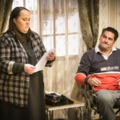The interactive game Flee Wisely and Schubert’s Winter Journey
There is no doubt that the refugee crisis is part of the zeitgeist now when even productions of Ferenc Herczeg’s Byzantium (at Újszínház) and Offenbach’s The Rhine Fairies (at Erkel Theater) refer, albeit obliquely, to the issue. Two shows, however, tackle the issue head on while stretching the conventional boundaries of theatre itself. One is the interactive game Menekülj okosan! (or Flee Wisely) at Jurányi Inkubátorház, and the other is a concert-production of Franz Schubert’s Winterreise (or Winter Journey) at Fischer Iván Lakásszínháza (Iván Fischer’s Apartment Theater).
Free Wisely at Jurány Inkubátorház
First, let us examine Free Wisely by the Lifeboat Group (Mentőcsónak Egység). Like their previous offering Sociopoly, this production combines elements of interactive theatre and board games in an effort to enlighten the audience about a particular issue – in this case, the refugee crisis. It is actually based on a game entitled “The Great Escape” developed by Amnesty International. We, the audience, sit in a classroom on four sides of the acting space. We represent a community of villagers who must flee Hungary on account of some unnamed disaster and cross Hostilia, a nation unsympathetic to our predicament, in order to reach possible safety in Finistan.
On this occasion, we face a situation that is more complicated than merely living out a month in the poorest county of Hungary (as in Sociopoly). Hence, the game gets off to a slower start as we try to determine the rules and figure out how much of this is theatre (with characters played by Niké Kurta and Bálint Jaskó), storytelling (as Afghan refugee Amin Mohammed Rezai relates his real-life experiences), and lecture (when presiding expert Emőke Takács shares relevant facts). Before we even fully understand the framework, we must make crucial decisions like what to travel with or whether to bury our dead before fleeing the village. This certainly reflects the uncertainty of the refugee’s existence, but it takes some time to become fully engaged.
How well does this work? Overall, it is challenging for anyone without a good command of Hungarian to participate. At every stage, there is some dilemma and a choice of four possible decisions, which each group (representing a “family”) must debate amongst themselves. Meanwhile, Amin’s story is fascinating, but his accent is difficult to decipher. The drama is mere embroidery, but it provides a thread that we can follow. Niké Kurta’s acting is excellent, and Amin has a disarmingly naturalistic style, but Bálint Jaskó's loud performance as the bigoted, self-appointed leader of the group is more suited to the stage than at such close quarters. Several thought-provoking issues are raised, and not all of them are satisfactorily covered (like incidents of suicide in refugee camps). On the other hand, the performers make effective use of minimal props, costumes, and effects. This gives the event a fascinating theatricality.
Despite its flaws, Free Wisely is a worthwhile experience if your command of Hungarian is strong enough. The game may have some kinks to work out, but there is plenty of thought-provoking material here to discuss long after the performance.
Winter Journey at Iván Fischer’s Apartment Theater
The aim of this concert-performance of Franz Schubert’s Winter Journey in Iván Fischer’s Apartment Theater, directed by Kornél Mondruczó, is similar. We are urged to put ourselves in the position of a refugee – ultimately, to empathize with the plight of illegal immigrants, who are often called migrants in the current political rhetoric. (This term only betrays a fundamental misunderstanding of the issue, since migrant refers to someone who visits another territory temporarily for some explicit goal such as employment.)
Here, the soloist (János Szemenyei) is a refugee, and the lyrics by Wilhelm Müller, originally about the nocturnal wanderings of a heartbroken lover, become a commentary on his desperate journey. The adaptation works surprisingly well with little cognitive dissonance. Often, with the timely use of props – such as a passport, a sleeping bag or second-hand clothes – the words acquire added meaning.
That said, this is probably not the best rendition of Schubert’s celebrated work that you will ever hear. I do not wish to diminish the accomplishment of János Szemenyei, who is an able performer. Still, he is taking on the Mount Everest of song cycles with little background in classical music. His previous studies included musical theatre. Consequently, he is over his head at times. Instead of expressing himself through the material, he seems to be imposing emotions on the melody and the German lyrics, which he delivers dutifully. He receives barely any assistance from pianist Károly Mocsán, who does not perform as a second soloist, but merely plunks out the accompaniment with no appreciable emotional investment.
Yet, all these quibbles are of little importance. The star of this show is the director’s concept, which is remarkable at expressing the limbo-like existence of refugees with its crushing loneliness (after all, a person can be most lonesome when alone in a crowd) and maddening suspension of time. The latter effect is spoiled somewhat when the singer rushes the transitions between songs, but then it is stunningly conveyed by the video clips of actual immigrants, recorded by Kornél Mundruczó himself in Hungary’s refugee camps. It is difficult for me to name another production where the video portion was used so effectively, complementing the action without overwhelming the performance. Whenever Mundruczó’s direction seems forced or over-dramatic (and there is one glaring instance), the video brings us back to reality with the silent faces of fleeing foreigners. The music provides a voice for their unspoken thoughts and emotions like an internal aria.
************************************
Note: A Hungarian translation of the German lyrics is provided, but if you want an English version, you should search the internet before the show. Here is a list of the songs performed (No. 1: Good Night, No. 3: Frozen Tears, No. 4: Frozen, No. 5: The Linden Tree, No. 6: Flood, No. 8: Backward Glance, No. 9: False Light / Will o’ the Wisp, No. 11: Dreams of Spring, No. 12: Loneliness, No. 13: The Post, No. 14: The Gray Head, No. 17: In the Village, No. 20: The Signpost, No. 21: The Inn, No. 22: Have Courage, No. 23: The Mock Suns, and No. 24: The Hurdy-Gurdy Man).
A bejegyzés trackback címe:
Kommentek:
A hozzászólások a vonatkozó jogszabályok értelmében felhasználói tartalomnak minősülnek, értük a szolgáltatás technikai üzemeltetője semmilyen felelősséget nem vállal, azokat nem ellenőrzi. Kifogás esetén forduljon a blog szerkesztőjéhez. Részletek a Felhasználási feltételekben és az adatvédelmi tájékoztatóban.





